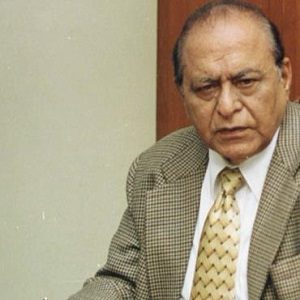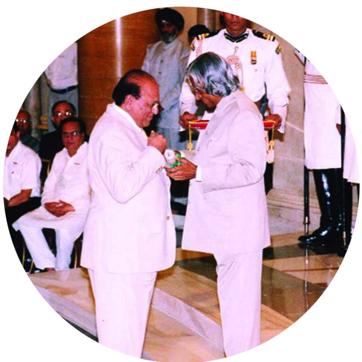
It's rightly been said, that "Words can be like X-rays if we use them properly , they'll go through anything. We read and we're Awaken."
The very famous Urdu scholar and critic Gopi Chand Narang has acquired recognition all around the world for his outstanding contribution in various Novels and literature.The decent 91-year-old literary theorist on his early memories of growing up in Balochistan, and later on arriving in Delhi after Partition, and then on the poetry of Ghalib and Mir, and on his lifelong association with Urdu was born in the small town of Dukki in Balochistan, which is on the border amidst Pakistan and Afghanistan.His father Dharam Chand Narang , who was a scholar of Sanskrit and Persian encouraged him to read as intellectually nurturing influencer. The language that was spoken at his home was Saraiki, which is a combination of Indic and Western Punjabi. As a result, he devoured writings by authors like Ratan Nath Sarshar, the poetry of Ghalib, Iqbal, and other great Urdu poets, in addition to serious works of theology, Bhakti, and Sufism by authors like Dr Radhakrishnan and Dr Syed Abid Husain at a tender age. Consequently, with his strong determination and hearted-passion he received, the most notable Awards in his career like, Sitara-e Imtiaz in 2012 and President’s Gold Medal in 1977 from Pakistan followed by the Padma Shri which he received in1990,Sahitya Akademi Award (1995), and finally in 2004 he has been honored with Padma Bhushan Award in India. In 2007 being the recipient of a D. Litt. (honoris causa) from the University of Hyderabad , Aligarh Muslim University (2009), and Maulana Azad National Urdu University,Hyderabad (2012),he has also been provided with the rare honour of being bestowed as the Professor Emeritus by both, University of Delhi and Jamia Milia Islamia.
Gopi Chand Narang has also served as the Vice Chairman at Delhi Urdu Academy from1996 to 1999, and promoted as Vice Chairman at National Council for Promotion of Urdu Language (1998-2004), and led the foundation of Urdu as a President of the Sahitya Akademi (2003-2007). Having written more than 65 books in Urdu, Hindi and English.His famous book "The Hidden Garden" gained him more name and fame from foreign countries like Australia,Belgium,Luxembourg and South Asia sub-continents.
He mentioned that during the Partition in 1947, he was the luckiest to migrate to India in a Red Cross plane along with his elder brother in the middle of the Quetta holocaust. I lived alone in Delhi and enrolled himself in Dilli College to continue his futher studies. He completed his BA degree in 1950 and a Master’s in Urdu four years later on.He was happy enough that he made great academic progress in very difficult circumstances but, at the same time, his family was not happy that he had chosen Urdu as the field of study instead of mathematics, physics or chemistry that could make him an engineer or a scientist. But, for Gopi Chand, the pursuit of his heart’s passion was more important than gaining a professional position in life. That is why he have never regretted on his decision to become a student and a champion of the Urdu language.
Introducing, Faridoon Shahriyar who is a renowned Entertainment Producer, and Content Head Bollywood Hungama who believes in credible infotainment.
Let's look into the enlightening interview by Faridoon Shahryar, A Journalist at bollywood hungama and wonderfully answered by Gopi Chand Narang on Kavishala -
1) Sir, your writing in the prelude to The Urdu Ghazal under Urdu’s cross-cultural , its indigenous sensibility, its rich and varied heritage and its demanding mystique made you so much generous towards ethics and with it when you migrated after Partition. Tell us about the ideas during the creation of "A gift of India's Composite Culture" with regard to Urdu language and somewhat hindi then, especially in the light of your association with some of the brightest minds of the time, like Professor Ale Ahmad Suroor and Malik Ram.
He said, "I accolade myself as a protagonist of this book.This book has many hidden mysteries exposed of my young memories and ethics. Because there was a time before the Partition when Baba-e Urdu Maulvi Abdul Haq used to teach Sabras by Wajhi, a Dakhini prose masterpiece. In the riots preceding the Partition, the office of AnjumanTarraqqi Urdu in Daryaganj, where the esteemed Maulvi was secretary, had been reduced to ashes.Like the pearls in the coral of the sea reef I was flowing in the deep thoughts of my memories while writing this book. Some half-burnt Urdu books of the Anjuman were available on the pavements of the nearby Urdu Bazar, which I bought for keeps. Ibadat Barelvi, who was popular among the Progressives, had also left Dilli and migrated to Lahore and gone to Oriental College there. Between the old hands, only Khwaja Ahmed Faruqi was still there, and he lived in a little shack next to the historic Ghaziuddin madrasa adjoining the college building.
I came to know great Urdu scholars like Syed Abid Husain, Professor Ale Ahmad Suroor and Malik Ram, and many others during my academic life. These were exceptional people who were fully committed to their scholarly pursuits.All these people had a great love for the country, its democratic institutions, and the values of secularism.When I entered Delhi University in 1952 for my Master’s degree in Urdu, the classes were held in Zakir Husain College. This is the same college where Mirza Ghalib was once offered professorship. The alumni of college included Urdu’s great writers and poets. This was not the Dilli that everyone knew. Although there were new students who were enrolling in varoius courses, I was the only student in the Urdu post-graduate studies. And now everything had transformed"

President APJ Abdul Kalam deliberating Padma Bhushan to Gopi Chand Narang (2004).
2) This book has come a long way from the combinatrics of proto-model of stalwarts such as Ghalib, Mir and Momin, Zafar and Daagh in the 18th and 19th centuries to the Moderns like Faiz, Josh and Firaq and many others, and, finally, contemporary poets like Gulzar and Javed Akhtar. From many decades we saw the ghazal emerges as the shadow of Sufism to become the medium for the expressions of belongingness and contemporary revolution. Kindly throw a light on these thematic concerns coming from historic miscegenation.
